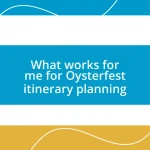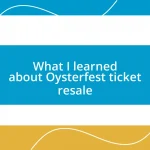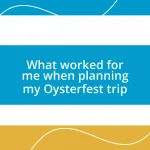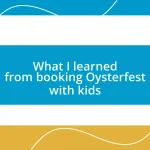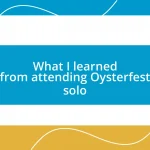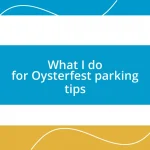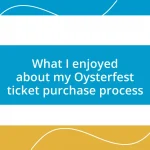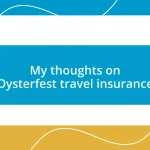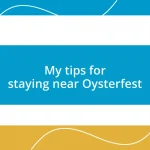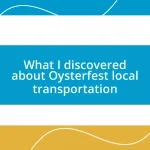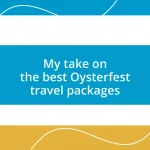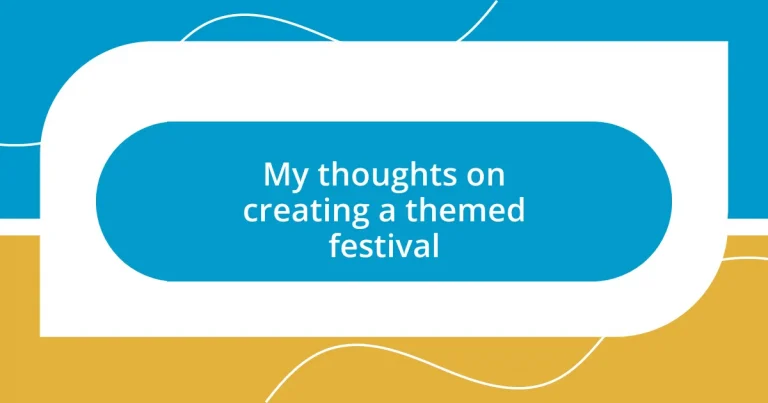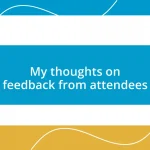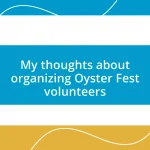Key takeaways:
- A well-defined theme and strong organization are crucial for creating a cohesive and enjoyable festival experience.
- Community engagement fosters connection, local talent showcase, and enhances the festival’s overall atmosphere, making it more inviting and memorable.
- Utilizing effective marketing strategies, incorporating feedback, and embracing trends like sustainability and technology are essential for future success and attendee satisfaction at festivals.
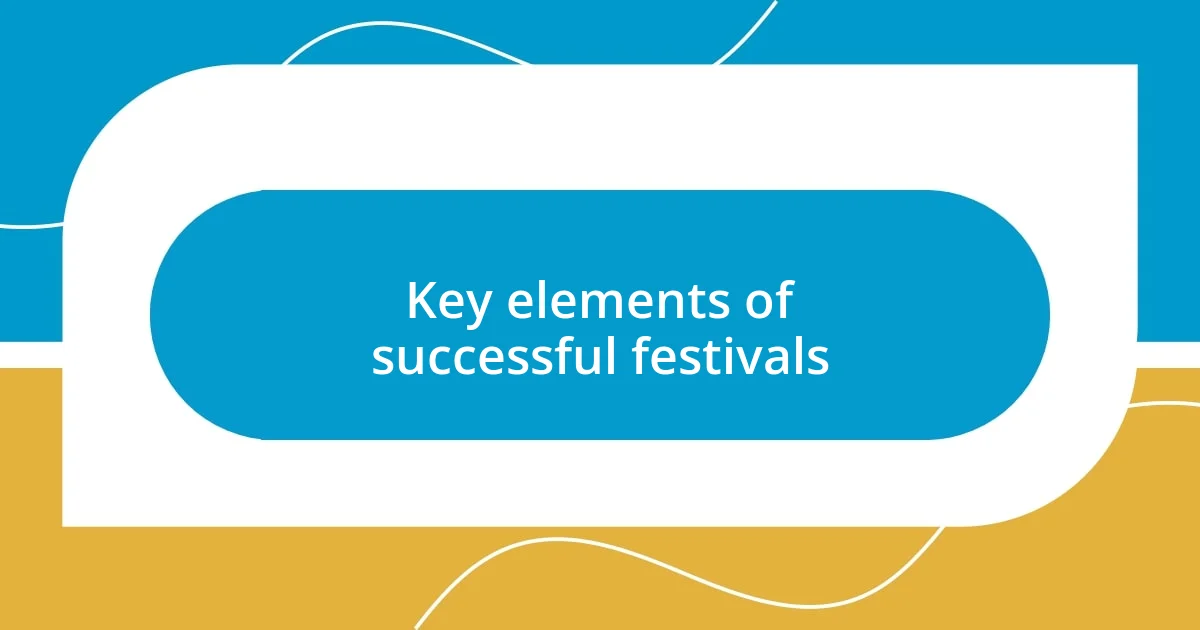
Key elements of successful festivals
One key element of a successful festival is a well-defined theme. I remember attending a local arts festival that centered around sustainability. It was such a satisfying experience to see every corner of the event—from the vendors to the workshops—embracing that theme. It created a cohesive atmosphere that drew in people who were passionate about the same cause. Doesn’t it make you wonder how a unique theme could shape the experience at any festival you plan?
Another essential aspect is the organization behind the scenes. I once volunteered at a music festival and saw firsthand the meticulous planning required—from scheduling performances to coordinating food vendors. When everyone knows their role and expectations, it significantly reduces chaos. Have you ever been to a festival where it felt like chaos reigned? It can really detract from the enjoyment, reminding us just how vital strong leadership is.
Don’t overlook the power of community engagement. I recall a festival that included local artists and performers, which not only enriched the event but also fostered a sense of belonging among attendees. It felt heartwarming to witness people celebrating their own culture and talents. How often do we underestimate the impact of connecting with our local talent? Building those bridges can turn a one-time event into a cherished tradition.
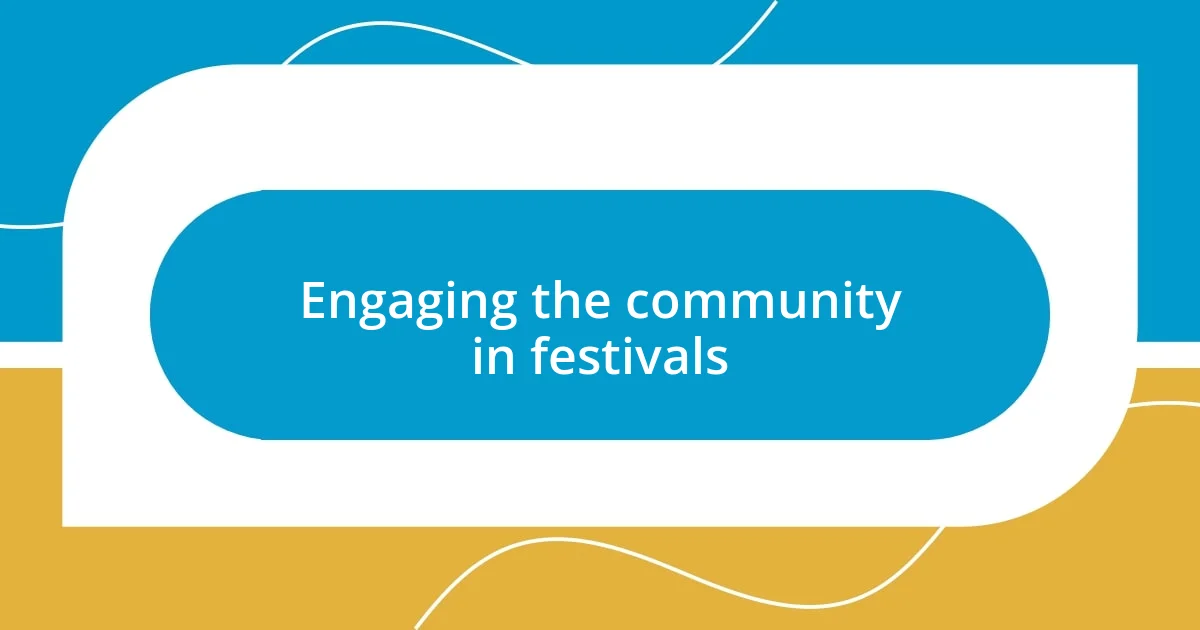
Engaging the community in festivals
Engaging the community in festivals opens doors to creativity and collaboration that can transform a simple gathering into a vibrant celebration. I distinctly remember a food festival where people from various cultural backgrounds set up stalls showcasing their traditional dishes. The air was filled with laughter and delightful scents, as families shared stories about their recipes. Have you ever tasted something that instantly reminded you of home? That’s the kind of connection festivals can nurture.
Building connections through community involvement allows you to tap into a sea of local talent. I was once part of a festival committee that invited local musicians to perform. The pride on their faces as they shared their music was palpable. It’s one thing to attend a concert; it’s another to be rooting for someone from your own backyard. The energy shifts when everyone’s emotionally invested. I often think about how festivals can serve as platforms for self-expression and shared experiences.
Moreover, incorporating community feedback can lead to even more engagement. Last year, during a planning session for my town’s annual fair, we decided to host a brainstorming event. Residents voiced their ideas for activities, leading to a series of workshops featuring local artisans. Engaging everyone not only fosters ownership but also creates anticipation in the lead-up to the festival. How many times have you felt more excited about an event when you had a say in its planning?
| Community Engagement Strategies | Impact on Festival Experience |
|---|---|
| Inviting Local Performers | Fosters pride and connection among attendees |
| Offering Workshops and Classes | Encourages learning and participation |
| Feedback Sessions with Residents | Builds anticipation and ownership |
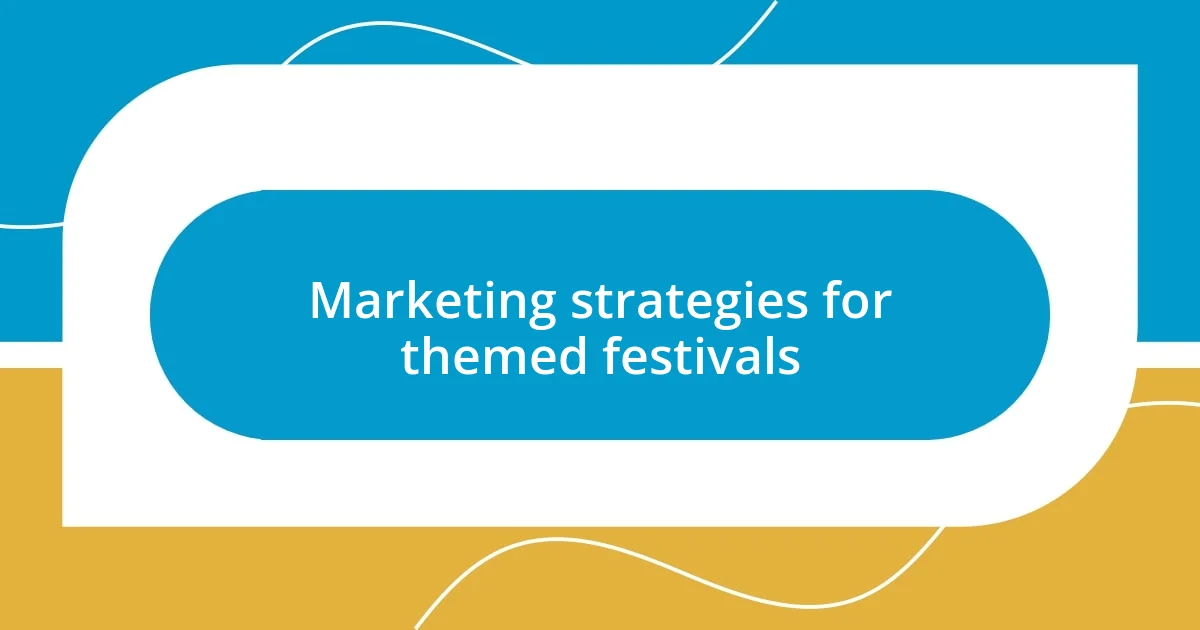
Marketing strategies for themed festivals
Creating an effective marketing strategy for themed festivals is crucial to attracting attendees and generating buzz. I once participated in a small craft beer festival that utilized social media like a secret weapon. The team created engaging posts that not only showcased the brewers but also shared behind-the-scenes content, making me feel like I was part of the journey even before the event began. Do you remember engaging with content leading up to an event and feeling that flutter of excitement?
To make your festival stand out, consider integrating the following marketing strategies:
-
Leverage Social Media Influencers: Partnering with local influencers can enhance visibility and create a buzz around your festival. Their authentic voices resonate with their followers, which can lead to increased ticket sales.
-
Engaging Email Campaigns: I fondly recall receiving personalized emails about an upcoming arts festival. They weren’t just announcements; they told stories of the artists involved. Craft email campaigns that tell a story or offer sneak peeks to eliminate any hesitation potential attendees might feel.
-
Create Themed Merchandise: I’ve seen festivals sell unique, themed merchandise that people love to wear and display on social media. It’s a fantastic way to create a sense of belonging while also providing extra revenue.
-
Utilize Local Media: Don’t underestimate the power of community news outlets. When I helped promote a themed weekend featuring local history, we chalked up increased attendance thanks to a simple press release that caught the eye of local reporters.
Engaging your audience through thoughtful marketing strategies can create that spark that not only increases attendance but builds rapport within the community, drawing more people in for future events.
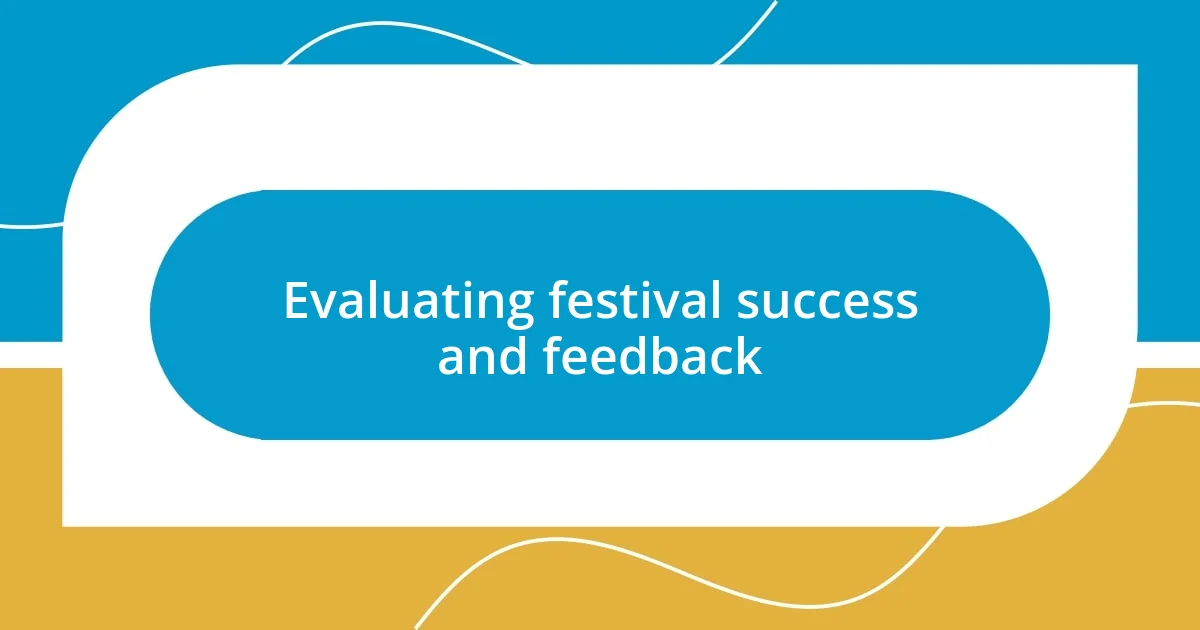
Evaluating festival success and feedback
Evaluating festival success often hinges on the feedback gathered both during and after the event. I recall attending a themed carnival where a simple post-event survey revealed surprising insights. Some attendees loved the live performances, while others felt the food options were lacking. Have you ever been part of a feedback loop where your opinion directly influenced future events? It’s invigorating to see how a single suggestion can shape the experience for the better.
Analyzing your festival’s success should also include social media interactions and online reviews. After one festival where I volunteered, we closely monitored our hashtag to gauge attendee excitement. The flood of images and comments not only reflected joy but also highlighted areas for growth, like better signage. This real-time feedback loop reminded me how crucial it is to stay connected with the audience—what is more valuable than knowing what resonates with them?
Lastly, I believe incorporating key performance indicators (KPIs) is essential for understanding overall success. For example, tracking attendance numbers, ticket sales, and vendor satisfaction helps paint a clearer picture of where the festival stands. One year, when we saw a dip in attendance, we dug deep into why that might be. It turned out our festival date clashed with several local events. How important is it to learn from past experiences to make future ones even better? It’s this blend of qualitative and quantitative feedback that truly informs the evolution of any festival.
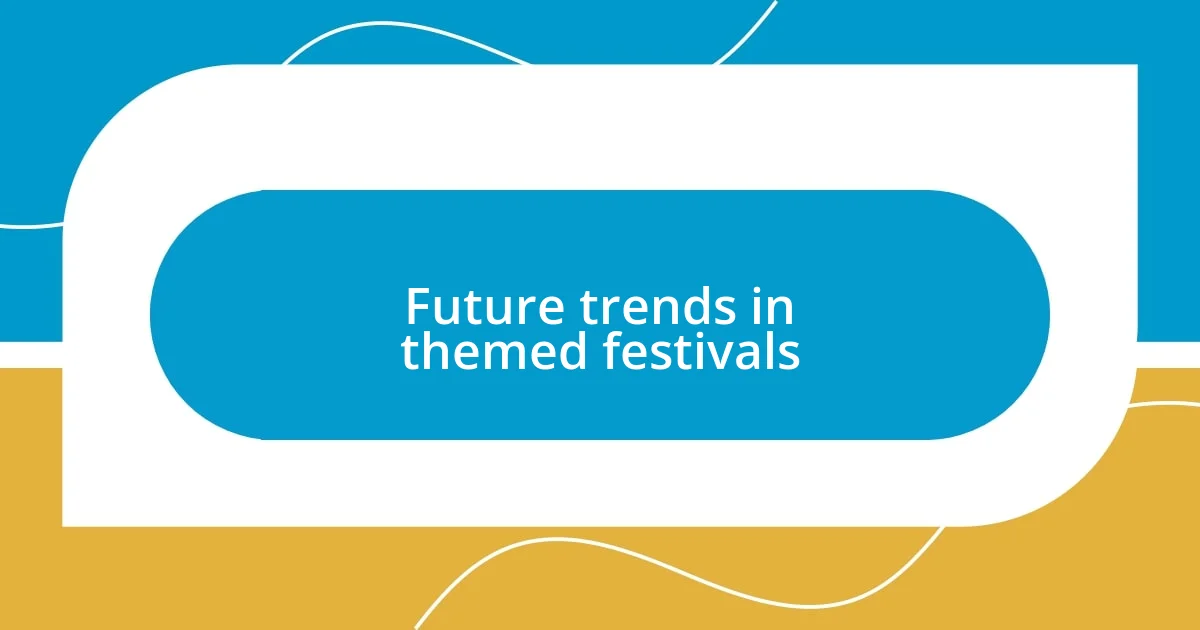
Future trends in themed festivals
I’m excited to dive into the future of themed festivals. As I reflect on the direction they’re heading, it’s evident that sustainability is becoming an essential focus. I once attended a festival that implemented extensive recycling initiatives. It made me proud to be a part of an event that not only entertained but also lifted the environmental responsibility banner. How refreshing is it to see festivals embracing eco-friendly practices? I believe these will soon be non-negotiable.
Another trend I see gaining momentum is the integration of technology. I remember visiting a themed event that utilized augmented reality for scavenger hunts. It was exhilarating to use my phone to unlock hidden features throughout the festival. This innovation brought a layer of interactivity that kept me engaged. Just think about how immersive experiences can transform a traditional festival into something memorable and shareable.
Finally, the personalization of attendee experiences is on the rise. At a recent themed fair, I was thrilled to see various workshops tailored to different age groups and interests. It felt like the organizers had me in mind personally, making my participation much more rewarding. Have you ever felt like an event just “got” you? That’s the beauty of personalization; it creates a stronger connection between the festival and its attendees, ensuring they leave with cherished memories and a desire to return.
